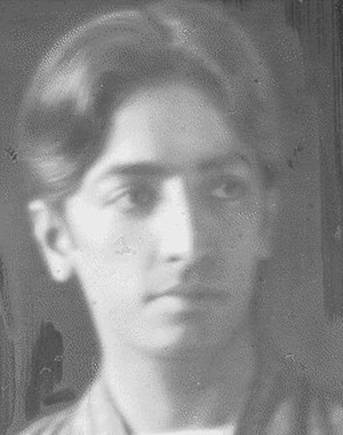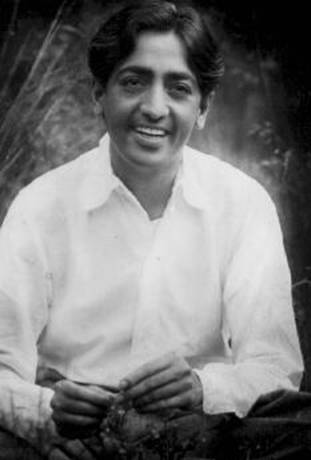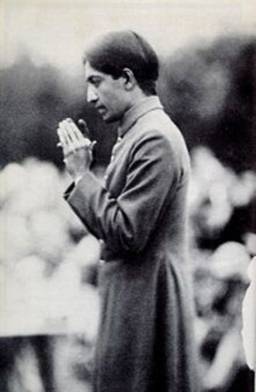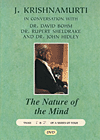|
|
 |
 |
 |
 |
 |
 Selected Quotes Selected Quotes

Truth is a pathless land …
“I maintain that Truth is a pathless land, and you cannot approach it by any path whatsoever, by any religion, by any sect. That is my point of view, and I adhere to that absolutely and unconditionally. Truth, being limitless, unconditioned, unapproachable by any path whatsoever, cannot be organized; nor should any organization be formed to lead or to coerce people along any particular path.”
Be a light unto oneself …
“So all this brings us to a certain point, which is: that one must be a complete light to oneself. As we are not light unto to ourselves, we rely on others. As you are listening, you are relying on the speaker to tell you what to do. But if you listen very carefully, the speaker is not telling you what to do; he is asking you to examine, he is telling you how to examine and what is implied in the examination. By examining very carefully, you are free of all dependence and you are a light to yourself. That means you are completely alone.”
Leader and follower …
“Leaders destroy the followers and followers destroy the leaders.”
Life is an integrated whole …
“You must understand the whole of life, not just one little part of it. That is why you must read, that is why you must look at the skies, that is why you must sing and dance, and write poems and suffer and understand, for all that is life. ”
 Top of page Top of page
|
 |
 |
 |
 |
 |
 |
 |
 |
 |
 Timeline
Timeline
| 1895: |
Jiddu Krishnamurti born May 12 in Madanapalle, Andhra Pradesh, India. Father was member of Theosophical Society. Eighth child in a high-caste Brahmin family, Jiddu was the family name |
 |
| 1898: |
Brother Nityananda born |
| 1902: |
James Joyce offers himself to Theosophist George 'AE' Russell as possible Irish Messiah |
| 1905: |
Krishnamurti’s mother dies |
| 1909: |
Jiddu family moves to Chennai, India. Krishnamurti attends High School |
| 1909: |
Krishnamurti given mystical name “Alcyone” |
| 1910: |
Annie Besant and Leadbeater adopted Krishnamurti |
| 1910: |
At the Feet of the Master was published under “Alcyone” name |
| 1911: |
Order of the Star in the East (first Order of the Rising Sun) founded with Krishnamurti as its head to proclaim the coming of the World Teacher |
| 1917: |
Krishnamurti fails to get into Cambridge University |
| 1922: |
California beginning of “the process” |
| 1923: |
Travel and speaking in USA |
| 1923-31: |
Writes about 60 poems |
| 1924: |
Krishnamurti's father dies |
| 1925: |
Brother Nityananda dies unexpectedly |
| 1925: |
Krishnamurti switches to "I" speaking of World Teacher |
| 1926: |
Hollywood offers Krishnamurti movie role as Buddha at $5000/week |
| 1927: |
Annie Besant announces: "The World Teacher is here." |
| 1927: |
Krishnamurti proclaimed: "I am the Teacher. I have entered into the flame-- I am the flame, I have united the source and the goal." |
| 1929: |
On August 2, 1929, the opening day of the annual Star Camp at Ommen, Holland, Krishnamurti dissolved the Order before 3000 members. |
| 1930s-40s: |
visited in California by Stravinsky, Brecht, Thomas Mann, Bertrand Russell, Frieda Lawrence, and Greta Garbo (who "made a rare venture into the open air, to join Krishnamurti on a picnic). They were seated together but, as Isherwood - who was also present - noted, “They didn't speak much. I think they were both scared.” |
| 1939: |
Krishnamurti meets Gandhi but was not impressed |
| 1941-1946: |
Lived in Ojai; Huxley encourages him to begin “Commentaries on Living” series |
| 1944: |
Krishnamurti attends LA class by Swami Prabhavananda |
| 1946: |
Ojai school opens; serious kidney infection |
| 1959: |
Physicist David Bohm reads Krishnamurti |
| 1975: |
Krishnamurti tells Mary Lutyens "... the Lord is here" |
| 1985: |
Towards the end of his life, Krishnamurti enjoyed having sections from Christopher Alexander's The Timeless Way of Building read to him each evening. |
| 1986: |
Treatment with morphine; last tape |
| 1986: |
J. Krishnamurti dies on February 17 at Ojai in California |
 Top of page
Top of page
|
 |
 |
 |
 |
 |
 |
 |
 |
 |
 Krishnamurti's Main Teachings Krishnamurti's Main Teachings

Human beings cannot find Truth through any organization, through any creed, through any dogma, priest or ritual, certainly not through any philosophic knowledge or psychological technique. They have to find it through the mirror of relationship, through the understanding of the contents of their own mind, through their observation of reality and not just through intellectual pursuits.
We have within ourselves beliefs that work as a security mechanism. Our beliefs dominate our thinking and our relationships. Our perception is thus shaped by our beliefs already established in our mind. Krishnamurti therefore rejects not only the outer authority but also the inner authority—the authority of one’s experience or thinking.
Real freedom is not a reaction; it is not a choice. It is pure observation without direction, without fear of punishment and reward. It is without motive; it is not at the end of our evolution but the first step of our existence. It is found in the choiceless awareness of our daily existence.
Thought is born of experience and knowledge, which are inseparable from time and the past. Thought is always limited and so we live in constant conflict and struggle. When we become aware of the movement of our own thoughts we will see the division between the thinker and thought, the observer and the observed, the experience and the experiencer.
Meditation if practiced right can help us. It is not an intellectual process. It is attention that has no borders, no limits. While in meditation one gives close attention to all that is happening in conjunction with the actual activity of thought, which is the underlying source of the general disorder. One does this without choice, without criticism, without acceptance or rejection of what is going on. And all of this takes place along with reflections on the meaning of what one is learning about the activity of thought. In this silence, something new and creative happens, something that cannot be conveyed in words, but that is of extraordinary significance.
 Top of page Top of page
|
 |
 |
 |
 |
 |
 |
 |
 |
 |
 Documents
Documents
| The Awakening of Intelligence (HarperSanFrancisco) |
|
The book contains discussions with scholars and scientists including Professor Jacob Needleman, Alain Naude, Swami Venkatesananda, and David Bohm. |
| |
|
| Can Humanity Change? Talks with Buddhist Scholars (Shambhala) |
|
The conversations, which took place in London in the late 1970s, focus on human consciousness and its potential for transformation. |
| |
|
| The First and Last Freedom (HarperSanFrancisco, 1954) |
|
The freedom of which Krishnamurti writes is the breaking of the debilitating, consuming concern with the self. Once people find this first freedom, they are liberated from the fulfilling and destructive obsession of society. |
| |
|
| Commentaries on Living: First Series (Quest Books, 1956) |
|
Commentaries on Living records Krishnamurti’s meetings with individual seekers of truth from all walks of life. Here he comments on the struggles and issues common to those who strive to break the boundaries of personality and self-limitation. Volume I of this three –volume series presents fifty enlightening essays—his views on dozens of topics such as knowledge, truth, and fulfillment. |
| |
|
| Commentaries on Living: Second Series (Quest Books, 1958) |
|
Volume II contains essays on topics like meditation, love, and effort. |
| |
|
| Commentaries on Living: Third Series (Quest Books, 1956) |
|
Volume III presents essays on topics like the search for truth, life and death, and education. |
| |
|
| Think on These Things (Perennial Library, 1964) |
|
A collection of talks on topics such as listening, ambition, conformity and revolt, equality and freedom, the attentive mind, and the need to be alone. The most popular Krishnamurti book which has sold more than 3 million copies in 22 languages. |
| |
|
| Talks and Dialogues (Avon Books, 1968) |
|
This collection includes talks and dialogues at Saanen |
| |
|
| Freedom From the Known (HarperSanFrancisco, 1969) |
|
In this classic work, Krishnamurti shows how people can free themselves radically and immediately from the tyranny of the expected, no matter what their age. And, by first changing themselves, people can then change the whole structure of society and their relationships. The vital need for change and the recognition of its very possibility constitute the rich essence of Krishnamurti’s message. |
| |
|
| The Penguin Krishnamurti Reader (Penguin Books, 1970) |
|
This volume, edited by Mary Lutyens, contains the problem of living, a message for the young, and questions and answers. |
| |
|
| Krishnamurti's Notebook (Gollancz, 1976) |
|
For seven months in 1961 and 1962, Krishnamurti kept a daily record of his perceptions and states of consciousness. The result is a kind of diary but one that is little concerned with the day-to-day process of living. |
| |
|
| MEDITATIONS (Shambhala, 1979) |
|
This classic collection of brief excerpts from Krishnamurti’s books and talks presents the essence of his teaching on meditation—a state of attention, beyond thought, which brings total freedom from authority and ambition, fears and separateness. |
| |
|
| The Ending of Time: J. Krishnamurti & Dr. David Bohm (Gollancz, 1985) |
|
Two great minds of the last century explore such questions as: Is the source of human conflict the individual’s inability to face that fact of what he or she actually is, psychologically, resulting in the imposition of an illusory goal of what one must try to become? Why has humanity thought so important in every aspect of life? |
| |
|
| Krishnamurti To Himself: His Last Journal (Harper & Row, 1987) |
|
Krishnamurti dictated his last journal into a tape recorder. In these pieces the reader comes very close to the great teacher—almost, it seems at moments, into his very consciousness. The gist of his teachings is here, and the descriptions of nature with which he begins most of the pieces may, for many who regard him as a poet as well as a philosopher, quiet their whole being so that they become intuitively responsive to what follows. |
| |
|
| The Book of Life (HarperSanFrancisco, 1995) |
|
The book presents 365 timeless daily meditations, developed thematically over seven days, illuminating the concepts of freedom, personal transformation, and living fully awake. |
| |
|
| KRISHNAMURTI: 100 years (Stewart, Tabori & Chang, 1995) |
|
This first, fully illustrated biography celebrates the centennial year of Krishnamurti’s birth and features recollection from people whose lives were transformed by the remarkable teacher. |
| |
|
|
Total Freedom: The Essential Krishnamurti (HarperSanFrancisco, 1996) |
|
|
This book is both an introduction to Krishnamurti and an essential, extensive collection. Revealing his core teachings in all their eloquence and power, these writings incite us to recognize that “Truth is a pathless land,” to accept no spiritual authority—not even himself—and to think critically, that we may free our minds and see clearly on their own personal journey. |
| |
|
|
This Light in Oneself: True Meditation (Shambhala, 1999) |
|
|
Krishnamurti sheds light on the true meaning of meditation. |
 Top of page
Top of page
|
 |
 |
 |
 |
 |
 |
 |
 |
 |
 DIGITAL MEDIA DIGITAL MEDIA
Crisis in Ourselves : Ojai 82, Talk 2 of 6 (60 minutes/ color)
Meditation & the Thinking Machine :
Ojai 82, Talk 6 of 6 (60 minutes/ color)
 Transformation of Man : Krishnamurti, Professor David Bohm, and Dr. David Shainberg Transformation of Man : Krishnamurti, Professor David Bohm, and Dr. David Shainberg
Introduction and Conversation 1
Are we aware that we are fragmented?
(80 minutes)
Conversations 2 &3
A mechanical way of living leads to discover
Can I completely change at the very root?
(110 minutes)
Conversation 4 & 5
In aloneness you can be completely secure
Your image of yourself prevents relationship with others
(115 minutes)
Conversations 6 & 7
Any form of image prevents the beauty of relationship
Life is sacred
(112 minutes)
On the Nature of Love : Ojai 82, Talk 5 of 6 (60 minutes/ color)
The Challenge of Change (60 minutes/ color)
 Nature of the Mind : Krishnamurti, Professor David Bohm, Dr. John Hidley, and Dr. Rupert Sheldrake Nature of the Mind : Krishnamurti, Professor David Bohm, Dr. John Hidley, and Dr. Rupert Sheldrake
Conversations 1 & 2
Roots of psychological disorder & psychological suffering
(115-minutes/ color)
Conversations 3 & 4
The need for security
What is a healthy mind?
(115-minutes/ color)
 Top of page
Top of page
|
 |
 |
 |
 |
|